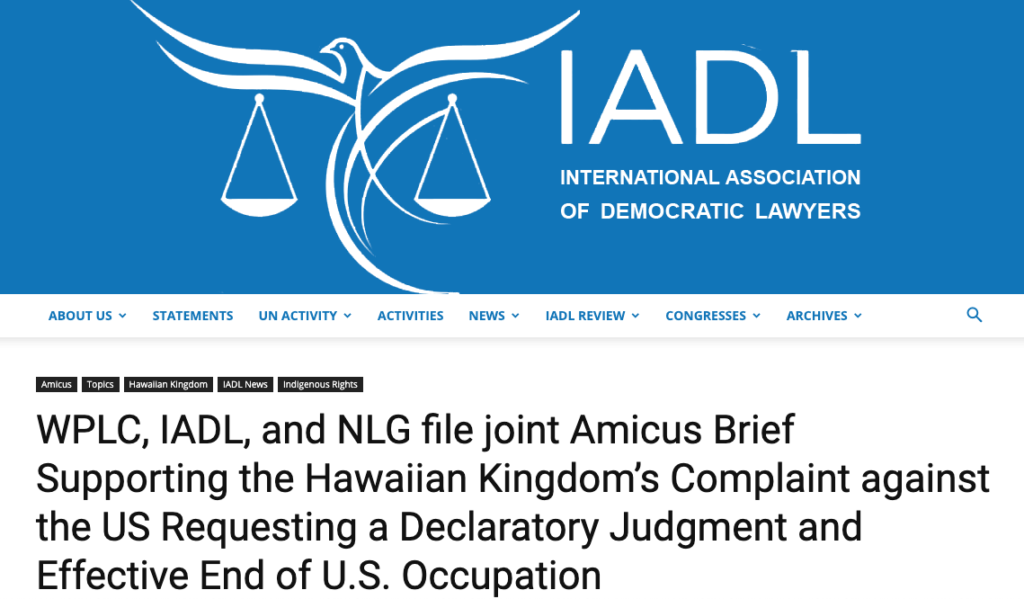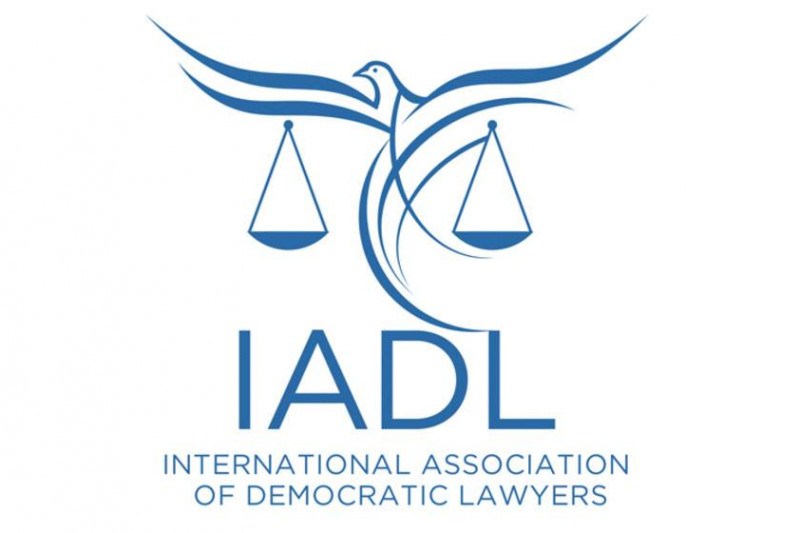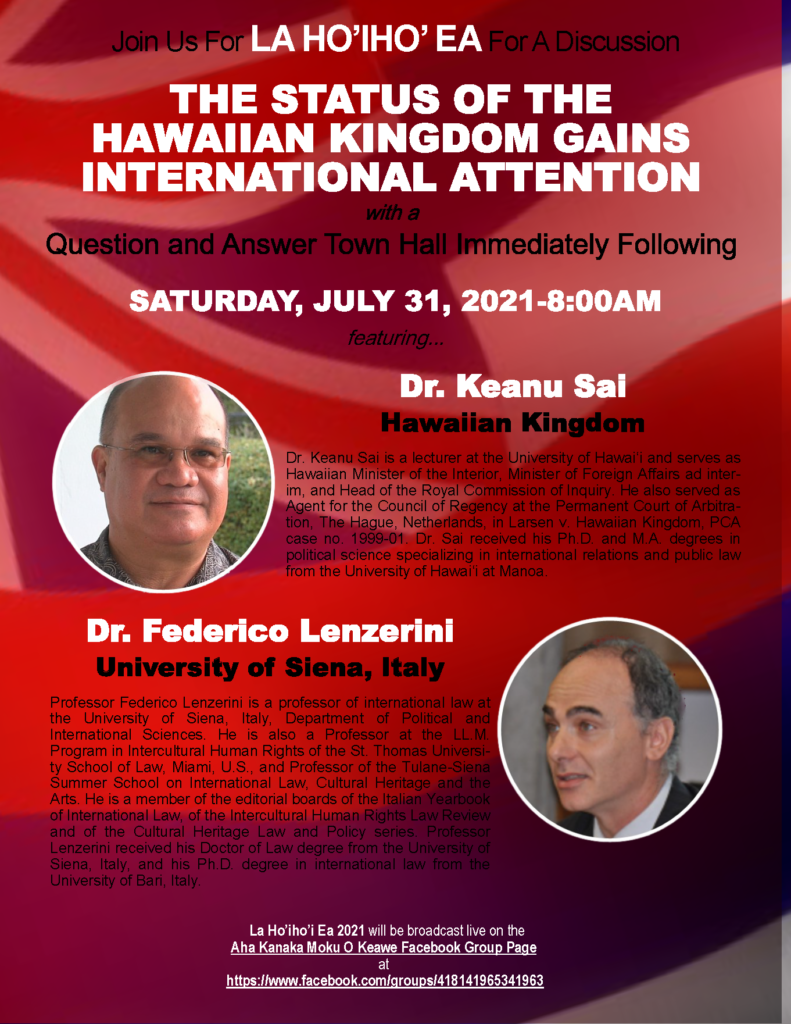

July 30, 2021
Contact:
Natali Segovia, Staff Attorney, WPLC: defense@waterprotectorlegal.org
NLG International Committee: international@nlg.org
Download the amicus brief here.
Honolulu—The Water Protector Legal Collective (WPLC), alongside the International Association of Democratic Lawyers (IADL) and National Lawyers Guild (NLG), filed an amicus curiae (“friend of the court”) brief today in support of the Hawaiian Kingdom’s complaint against the United States government, President Joe Biden, and other defendants, due to the unlawful occupation of Hawai‘i by the United States since January 17, 1893. The complaint and the amicus brief request Declaratory and Injunctive Relief, namely for the US to end the occupation of the Hawaiian Kingdom.
Hawai‘i has been illegally occupied by the US since 1893, when businessmen and politicians helped John Stevens overthrow Queen Lili‘uokalani and the Hawaiian government. One-hundred years later, President Clinton would apologize and the US would acknowledge that Hawaiian Kingdom never relinquished their land. That is not enough. The people of the Hawaiian Kingdom have remained continuously opposed to the illegal occupation of the US and its effects, including de-nationalization, the exploitation of natural resources, legacy of racial unrest sown by colonialism, and over-tourism at the expense of Native Hawaiians.
Mr. Dexter Ke`eaumoku Ka`iama, Acting Attorney General for the Hawaiian Kingdom who filed the original complaint, described the amicus brief filed by the three legal organizations: “The amicus transcends over 128 years of the illegal occupation of the Hawaiian Kingdom, the violations of international law and international humanitarian law and political pressures and trappings brought to maintain this illegality. Instead, the amicus rightly directs our attention to the undisputed history of the Hawaiian Kingdom and proper application of international law, US Constitutional law and compacts (treaties) between the sovereign States of the Hawaiian Kingdom and the United States.”
While relief in this matter would seemingly be barred by the political question doctrine, the amicus brief states the federal and state courts of Hawai’i are de facto Article II courts since 1893 because the US occupation of the Hawaiian Kingdom has never ended or been resolved through an operative peace treaty. Experts in international law and human rights have determined that without some type of transfer of sovereignty, the Hawaiian Kingdom and its people have the sole right to that land. There is judicial precedent of at least 12 Article II executive “occupation” courts in U.S. legal and political history since the Mexican War in 1846, provisional courts during the Civil War, and through 1971 when the United States returned Okinawa and Ryukyu Islands to Japan after WWII.
“At its core,” says WPLC Staff Attorney Natali Segovia, “this case is about the sovereignty of the Hawaiian Kingdom and the right of self-determination of an entire Nation. I don’t mean luke-warm self-determination within the boundaries of a settler state; I mean the self-determination that is at the heart of international law: the right of nations to self-govern to freely determine their political status, their economic, social, and cultural development within their own territory. Standing Rock, Line 3, and the #Landback movement share this in common. WPLC began at Standing Rock, where the fight for the water and for future generations was a manifestation and exercise of self-determination of the Oceti Sakowin Oyate and Indigenous Peoples and allies around the world that answered their call. WPLC is committed to supporting those struggles for sovereignty and self-determination of Indigenous Peoples and Original Nations wherever we can.”
“As an organization that values human rights and the rights of ecosystems over property interests, the NLG supports all Native peoples’ right to self-determination and resistance against settler-colonial oppression—whether it be in Palestine, Standing Rock, or Hawai’i. The US is no exception to standards set by international and humanitarian law, and must end its occupation of the Hawaiian Kingdom,” said NLG President Elena Cohen.
IADL President Jeanne Mirer said, “As an international organization of human rights lawyers dedicated to the furtherance of peace, justice, and the rule of law, the IADL reiterates its support for the Hawaiian Kingdom and the people of Hawai‘i in their ongoing struggle for sovereignty, and self-determination. The United States has an obligation to comply with international humanitarian law and the law of occupation.”
Mr. Ka`iama concluded, “Filing of the amicus coincides with the formal restoration of the Hawaiian Kingdom from the British Government on July 31, 1843. A day that is remembered and celebrated as Lā Hoʻihoʻi Ea (“Restoration Day”). So too, this amicus will be forever marked and fondly remembered in the annals of the Hawaiian Kingdom. Aloha ‘Āina.”
“Aloha ‘Āina” is Hawaiian for “love of the land.” As legal organizations committed to human rights, international law, and the rule of law, we stand — for the land, for the water, and for future generations.
Counsel for Amici Curiae NLG, IADL, and WPLC are Natali Segovia, Joseph (Joey) Chase, and Charles Heaukulani.
#Landback #HawaiianKingdom #AlohaAina
—
The International Association of Democratic Lawyers (“IADL”) is an international organization of human rights lawyers and jurists founded in 1946, with member associations and individual members in over 90 countries and with consultative status in ECOSOC. IADL is dedicated to upholding international law and promoting the tenets of the UN Charter in furtherance of peace and justice.
The National Lawyers Guild (“NLG”) was formed in 1937 as the first national racially integrated bar association in the U.S. to advocate for the protection of constitutional, human, and civil rights.
The Water Protector Legal Collective (“WPLC”) is an Indigenous-led legal non-profit organization that began in 2016 as the on-the-ground legal team at Oceti Sakowin camp at Standing Rock in defense of Water Protectors in frontline resistance to the Dakota Access Pipeline. WPLC continues to provide legal support and advocacy to Indigenous Peoples and Original Nations, the Earth, and climate justice movements.
Support the Hawaiian Kingdom. To learn more, visit:


